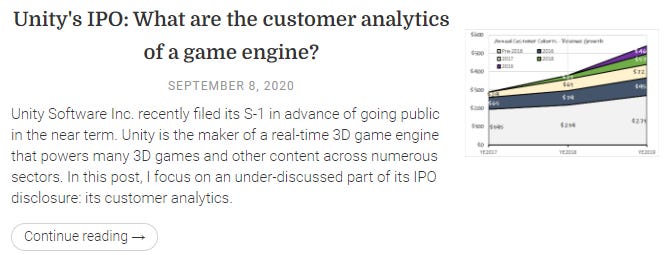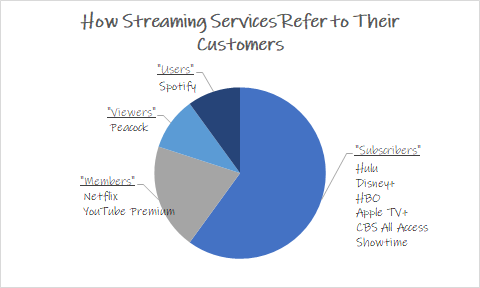Hello,
I've decided to formalize this email list from my website into a place where I continue to share my latest long-form posts (I plan to do these a bit more often with a few in the works), but also a periodic (monthly-ish) newsletter with shorter notes, fascinating things I've seen/read recently, or anything else that is interesting to me.
My hope is that this is both informative and a good way to keep in touch. Feel free to reply online or offline.
Here is the first edition:
Customer Economics
My latest post was on Unity's customer analytics using some of its limited disclosure.
Background:
I have spent a lot of time on customer analytics and am always interested when I see a customer-cohort-chart, such as the one included in Unity's S-1 filing to go public:
Much had been written about Unity as it is a very well-known company, however nobody (from what I could find) performed any sort of cohort analysis using this chart because it lacked a y-axis and only included recent cohorts. I was able to "fix" these problems and glean a lot of new information that enabled some interesting analysis on the company.
Music Monetization
A fascinating chart from Matthew Ball on revenue sources of the music industry over time:
Most interesting to me:
There has been an incredible amount of disruption over the years with many technology shifts.
The audio industry has recovered over the last decade thanks to higher live concert revenue and new revenue sources including streaming, podcasts, and audiobooks.
It is incredible how quickly physical music (CDs, etc) sales disappeared in the mid-2000's.
Not distinct in the chart, but virtual concerts are just getting started:
A Travis Scott concert in Fortnite brought in over 12 million viewers and may have the cultural relevance that Saturday Night Live once had: "This is a tour stop. If you're on tour, you want to stop on the Fortnite stage."
Wave has been putting on virtual concerts for the likes of The Weekend, John Legend, and Lindsey Stirling. The LA-based startup just raised $30M in June.
Membership vs Subscription
On the difference between a membership and a subscription:

The way I think about this is that when the customer receives more than the product/content/etc., it is a membership. Memberships offer benefits such as free shipping, exclusive access, or discounts; but more than that, they are relationships with identity, status, and community.
Amazon Prime and Costco are examples of this. These memberships are not tied to a transaction, but rather bestow a status or identity (with benefits, of course): "I am a Costco member" rather than "I shop at Costco". "I belong" rather than "I subscribe".
The difference may be powerful enough that some companies position their services as memberships even if they are functionally subscriptions. For example, Netflix makes an active choice to always refer to its customers as members, not subscribers. This is in contrast to virtually every other streaming service where customers are called subscribers, users, or viewers.
The key benefit to memberships over subscriptions is higher retention. Customers are less likely to churn if there is a greater sense of belonging (relationship vs transactional) and the perceived value received is more than just product/content. The more a company taps into some sort of identity, community, or status element, the more likely customers are going to stick around.
Higher retention, along with the ability to extract additional revenue beyond the actual product or service being provided (for example the cost of an Amazon Prime membership is separate from purchases), means that memberships are generally more valuable than subscriptions, and companies should generally strive for the former.
Longevity
A recent study provides a fascinating theory on how longevity research is flawed, looking at concentrations of humans with remarkable longevity in some areas of the world. These clusters of “supercentenarians” have been studied extensively in search of factors that drive longevity with proposed predictors including abnormal genetics, strong social connections, and lifestyle factors such as vegetable intake.
This study proposes an alternate explanation for why these clusters of long-living humans occur:
“...remarkable age attainment is predicted by indicators of error and fraud, including illiteracy, poverty, high crime rates, short average lifespans, and the absence of birth certificates.”
In short, most of the records of people living well beyond 100 years may be errors or fraudulent. One way to show this is to look at the number of recorded supercentenarians before and after birth registration came into effect in the United States:
If this theory is true, some of the super-longevity research may be flawed and hope for a magical death cure is misplaced. Perhaps we are back to what we know for certain leads to better quality of life and perhaps longevity: eat well and exercise. Genetics also likely play a significant role, but there is only so much one can do about that – for now.
Silence is Golden
If you ever want a justification for being a person that doesn't talk too much, I love this idea from More To That:
Silence is often interpreted as the space that lives between what is spoken. The moments of rest that punctuate a noisy world.
The reality, however, is that silence is the default state of the universe. We only interpret it as something temporary because we have adapted to a world where noise has become the new normal.
When you find yourself embracing a moment of silence, remember that you are not taking a break from the world. You are making a brief return to what actually is.
Until next time,
Steve







